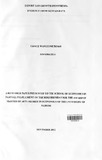| dc.description.abstract | The Export-Led Growth Hypothesis (ELGH) postulates that export growth is one of the key determinants of economic growth. This paper aims to investigate the Export-Led Growth Hypothesis in Kenya using annual time series data from 1976 to 2011 and dynamic time series techniques of Vector Error Correction Model, Auto Regressive Distributpd Lag and 2- Stage Least Squares. The 2-Stage Least Squares is used to correct for the endogeneity problem of the variables involved.
A seven-variable Vector Auto Regression (V AR) model (GDP, Exports, Imports, Household Consumption, Government Consumption, Gross Fixed Capital Formation and Foreign Direct Investment) is developed from a national income identity that links output to its contributing factors. The results indicate that there is unidirectional causality running from exports to economic growth. This implies that exportled growth hypothesis can be supported in the Kenyan economy in the short run.
Besides, our results suggest that the growth rate of household consumption and Gross Fixed Capital Formation have positive and statistically significant impacts on economic growth. Hence, in the case of Kenya, export enhancing policies that will improve the quantity, quality and value of exports in the overall GDP contribution of exports are recommended in promoting and sustaining economic growth. | en_US |

